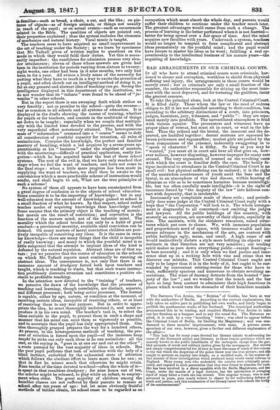BAD ARRANGEMENTS IN OUR CRIMINAL COURTS.
IF all who have to attend criminal courts were criminals, har- dened to shame and corruption, worthless to shield from physical suffering and injury, the arrangements in those courts would 1* merely cruel ; but as criminals are only a small fraction of the number, the authorities responsible for mixing up the most inno- cent with the most depraved, and for torturing the guiltless, incur the gravest censure. To take the principal alone, look at the Central Criminal Court. It is filled daily. Those whom the law or the need of redrew obliges to fill it are not classified according to their condition, but according to the arbitrary distinctions of a court, into prisoners, judges, barristers, jury, witnesses, and " public " : they are sepa- rated merely into penfolds. The unventilated atmosphere is fetid with vicious squalor. The prosecutors and witnesses have no proper place of retreat, but must sit in court, or wait in the lob- bies. Thus the refined and the brutal, the innocent and the de- praved, are huddled together: decent matrons are squeezed be- tween policemen and ragamuffins; modest girls are jostled by the boon companions of the prisoner, indecently swaggering in to " speak to character." It is filthy. So long as you may be "wanted," you must sit in court and hear all that goes on, how- ever tedious, however disgusting, however improper for many ears around. The very arguments of counsel on the revolting cases with which the court is familiar defile the ears. The bodily fa- tigue incidental to attendance in the Central Criminal Court is no small evil : but physical suffering can be endured ; it is the sight of the unstricken countenance of youth amid the base and the brutal, in an atmosphere of vice and disease, within hearing of allusions so vile as to be sometimes harmless because unintelligi- ble, but too often carefully made intelligible—it is the sight of innocence forced by "the majesty of the law" into hideous tone tact with depravity, that is intolerable. Incessantly are complaints made of these evils ; and periodi- cally does some judge at the Central Criminal Court reply with a hope that " the Corporation " will look to it. The whole arrange- ment is disgraceful to all concerned—not omitting the judges and lawyers. All the public buildings of this country, with scarcely an exception, are unworthy of their objects, especially in size. The ancients, with far slenderer resources, raised struc- tures which put ours to shame. We, with immense population and proportionate need of space, with immense wealth and im- mense advance in the mechanism of the arts, are content with public buildings ugly, mean, and small. A high sense of art would instinctively dictate a style more befitting its objects : our instincts in that direction are not very sensitive ; our trading spirit makes us pare down everything public—except feasting— to bare necessity; and it is only when we find justice and inno- cence shut up in a reeking hole with vice and crime that we discover our mistake. This Central Criminal Court ought not only to be larger than it is in the body of it, but ought to be sur- rounded by convenient retiring-rooms for those who have to wait, sufficiently spacious and numerous to obviate revolting as,. sociations. The want of decency detracts from the boasted' -ma- jesty of the law" ; and we wonder that the bench and the bar have so long been content to administer their high functions in places which would turn the stomachs of their humblest menial,.


























 Previous page
Previous page